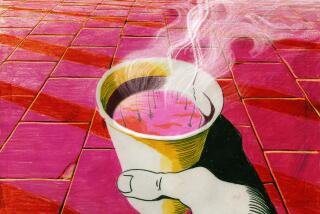Vincent G. Marotta dies at 91; talked Joe DiMaggio into pitching Mr. Coffee
- Share via
With 5,000 homes and seven shopping centers to his credit, Vincent G. Marotta was a successful builder in Ohio and could have filled his bathtubs with champagne. But he couldn’t get a decent cup of coffee, forced as he was to choose between the bitter sludge of a percolator and the powdered swill of instant.
Pondering the problem during a building slump in the 1960s, Marotta, an old high school friend and two engineers came up with a countertop gadget they called Mr. Coffee — a device that with the help of baseball hero Joe DiMaggio soon became a fixture in American kitchens.
Marotta, who persuaded the intensely private DiMaggio to peddle Mr. Coffee in TV commercials for 14 years, died Saturday at his home outside Cleveland in Pepper Pike, his family said in a statement. He was 91.
In the 1970s and 1980s, Marotta and his business partner Samuel L. Glazer employed more than 1,000 workers at their plant in Bedford Heights, Ohio. With workers in Mississippi and Mexico, they turned out as many as 42,000 Mr. Coffees daily.
In 1987, the friends from Shaker Heights High School, beset by increased competition and stiffer labor costs, sold their company, North American Systems, to Sunbeam. By 2004, production shifted to China.
Although Mr. Coffee was more expensive than many competitors when it was introduced, it brewed coffee twice as fast and ended up controlling half the market. Engineers Erwin Schulze and Edmund Abel Jr. developed the design. The patent was held by Abel, a tea drinker.
But it was DiMaggio who made Mr. Coffee what it became, Marotta said in interviews.
Known as a tough athlete but a suave presence, the always-dapper DiMaggio had retired from the New York Yankees in 1951.
Two decades later, Marotta thought he would make the perfect pitchman for Mr. Coffee.
“He was a great baseball hero who was well known in America, and a class guy who always had a suit and tie on,” Marotta told the Cleveland Plain Dealer in 2004. “He was a gentleman in every respect and had the mystique from his marriage to Marilyn Monroe. I thought that would give our product a lot of oomph.”
DiMaggio turned him down, but two days later, he received yet another unwanted call on his unlisted phone from Marotta, who had flown to San Francisco. He invited DiMaggio to lunch at the Fairmont hotel, and the astonished DiMaggio accepted.
“I talked a roll of cotton from Cleveland to Toledo about my grand and glorious plans,” Marotta recalled in the Plain Dealer interview. “A thousand things went through my mind, like a drowning guy. At the end of it, he shook my hand and said, ‘Vince, I believe in you. I’ll do it.’ ”
DiMaggio had won a Mr. Coffee at a golf tournament in Florida but never made much use of it. Afflicted with ulcers, he drank Sanka.
Born in Cleveland on Feb. 22, 1924, Marotta was the son of a coal dealer who immigrated from Italy.
A high school baseball player, he signed on with the St. Louis Cardinals but was drafted into military service before spring training in 1942. After being discharged, he studied at Mount Union College in Alliance, Ohio, and taught school for two years before entering the construction business.
He and Glazer, who died in 2012, were business partners for more than 60 years.
Marotta is survived by his wife, Ann; six children; and 11 grandchildren.
Twitter: @schawkins
More to Read
Start your day right
Sign up for Essential California for the L.A. Times biggest news, features and recommendations in your inbox six days a week.
You may occasionally receive promotional content from the Los Angeles Times.





